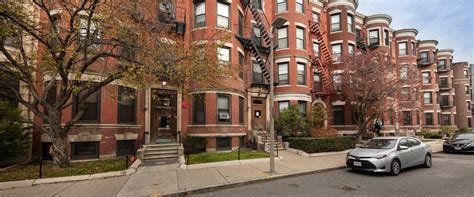Are you considering becoming a part of the vibrant Boston University community but are concerned about the cost of housing? This article delves into the complexities of Boston University housing prices, providing you with a comprehensive understanding of current market trends, factors influencing pricing, and tips for navigating the competitive rental market.

Rental Costs on the Rise
According to the Boston University Office of Residential Life, the average rent for a one-bedroom apartment near campus has risen by 5% in the past year, reaching approximately $2,500 per month. This increase reflects the high demand for housing in the area, driven by a growing student population and limited housing options.
Factors Influencing Housing Prices
Several factors contribute to the high cost of Boston University housing:
- Location: The university’s proximity to downtown Boston, a global hub of education and innovation, makes it highly desirable for students and professionals.
- Limited Supply: The availability of housing within walking distance of campus is constrained, resulting in increased competition for the available units.
- High Demand: Due to Boston University’s prestigious reputation and unwavering appeal, the demand for housing in the surrounding area remains consistently strong.
- Rising Construction Costs: The cost of materials and labor for new construction projects have surged, leading to higher rental rates for new buildings.
Navigating the Rental Market
Finding affordable housing near Boston University can be challenging, but there are strategies you can employ to maximize your chances of success:
- Start your search early: Begin looking for housing several months before the start of the academic year to avoid the peak season and secure better deals.
- Consider roommates: Sharing a house or apartment with roommates can significantly reduce your monthly rental expenses.
- Explore off-campus options: Expanding your search beyond the immediate campus vicinity can lead to more affordable housing options.
- Negotiate with landlords: Don’t be afraid to negotiate with landlords, especially if you are willing to sign a long-term lease or are a responsible tenant.
- Leverage university resources: Boston University offers various resources to assist students in finding housing, including the Off-Campus Housing Office and the Undergraduate Student Government.
Future Projections
Predicting the future trajectory of Boston University housing prices is uncertain, but experts anticipate a continued increase in demand and a corresponding rise in rental rates. Factors such as the university’s enrollment growth, economic conditions, and new development projects will significantly influence future trends.
Table 1: Average Monthly Rent by Property Type
| Property Type | Average Rent |
|---|---|
| One-bedroom apartment | $2,500 |
| Two-bedroom apartment | $3,000 |
| Three-bedroom apartment | $3,500 |
| Four-bedroom apartment | $4,000 |
Table 2: Factors Influencing Boston University Housing Prices
| Factor | Impact |
|---|---|
| Location | Increased demand for housing near campus |
| Limited Supply | Constrained availability of rental units |
| High Demand | Strong competition among renters |
| Rising Construction Costs | Higher rental rates for new buildings |
Table 3: Strategies for Navigating the Rental Market
| Strategy | Benefit |
|---|---|
| Start search early | Avoid peak season and secure better deals |
| Consider roommates | Reduce monthly rental expenses |
| Explore off-campus options | Expand housing search beyond campus vicinity |
| Negotiate with landlords | Potentially lower rent payments |
| Leverage university resources | Access assistance with housing search from BU |
Table 4: Future Projections for Boston University Housing Prices
| Factor | Impact |
|---|---|
| Enrollment Growth | Increased student population drives demand for housing |
| Economic Conditions | Economic fluctuations can affect rental rates |
| New Development Projects | Supply of housing can influence pricing |
Conclusion
Boston University housing prices are influenced by a complex interplay of factors, including location, supply, demand, and construction costs. While rental rates are generally high, students can navigate the market effectively by starting their search early, exploring cost-saving strategies, and leveraging university resources. As the university’s enrollment continues to grow and demand remains strong, future projections indicate a continued increase in housing prices. By staying informed about market trends and being prepared, potential tenants can make informed decisions and secure affordable housing near Boston University.
